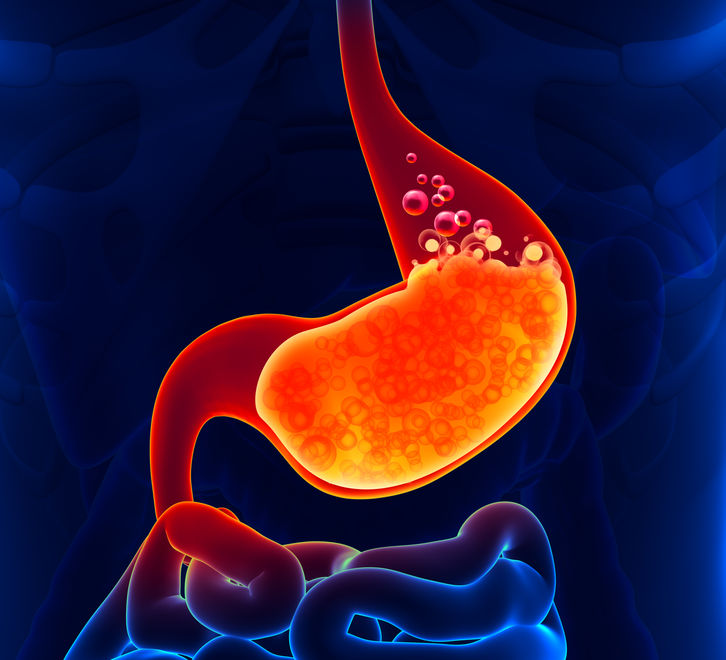Are you suffering from occasional heartburn symptoms – a burning sensation in your lower chest that moves up to your neck or throat? Or do you experience indigestion – discomfort in your stomach or upper abdomen, frequent burping, bloating, or feeling full too soon after eating? Read on to see what OTC treatment option might be right for you!
Also see our 8 tips for heartburn relief.
Pepcid (famotidine):
Pepcid, which is the brand name for the medication famotidine, is a histamine-2 receptor antagonist (also known as an H2RA). Your stomach is lined with cells that contain histamine receptors; by blocking histamine from binding to these cells, Pepcid reduces the amount of stomach acid produced in your GI tract. Their absorption is not affected by food, which means they can treat fasting and food triggered indigestion, as well as nocturnal heartburn and indigestion.
H2RA blockers like Pepcid begin working within 30-45 minutes and their duration of effect can last anywhere from 4-10 hours.
Tolerance to H2RA blockers can develop if taken daily, so it is best to take famotidine only as needed. Pepcid is recommended for those who experience occasional heartburn or indigestion.
The most common side effects of Pepcid are headache, diarrhea, constipation, dizziness, or drowsiness.
Prilosec (omeprazole):
Prilosec, which is the brand name for the medication omeprazole, is a proton pump inhibitor (also known as a PPI). PPIs work by irreversibly blocking certain pumps in the lining of your stomach that produce acid. This means their effects are stronger and last longer than H2RAs like Pepcid. Prilosec works best when taken 30 minutes before a meal.
PPIs like Prilosec begin working within 2-3 hours and their duration of effect lasts 12-24 hours. Because they irreversibly block proton pumps in your stomach, their effects last for months after only a 2 week course.
Prilosec and other PPIs should only be taken by those who have heartburn symptoms 2 or more times per week. It does not begin to work immediately and should not be used as needed. Prilosec works best when taken daily but should not be taken for more than 14 days. If heartburn symptoms do not resolve after 2 weeks or recur within 4 months, you should see a doctor.
The most common side effects of Prilosec are respiratory infections, diarrhea, constipation, and headache.
Long term use of PPIs like Prilosec may also come with an increased risk for pneumonia, a diarrheal infection called C. Diff, and hip fractures in patients over 50 years of age.
When do I need to see my medical doctor?
While OTC treatment options for heartburn and indigestion are available, professional medical help may also be necessary. If you experience any of the following symptoms, seek treatment from your medical doctor right away:
● Frequent heartburn or indigestion for more than 3 months
● Heartburn that continues after 2 weeks of treatment with nonprescription medications (such as Pepcid or Prilosec)
● Heartburn that occurs overnight and/or wakes you up from sleep
● Difficulty or pain swallowing solid foods
● Vomiting up blood or black, coffee-ground like material
● Black tarry stools
● Unexplained weight loss
● Continuous nausea, vomiting, or diarrhea
● Chest pain accompanied by sweating, shortness of breath, or pain radiating into your shoulder, arm, neck, or jaw
● If you are pregnant or nursing
TL; DR:
If you experience infrequent indigestion or heartburn, an H2RA such as Pepcid is a better choice for you. It works quickly and can be taken as needed.
If you have 2 or more episodes of heartburn per week, Prilosec is probably the right option for you.
Prilosec has been shown to be more effective than Pepcid at reducing stomach acid and relieving heartburn symptoms, but also comes with more potentially serious side effects.
If you are still experiencing heartburn or indigestion symptoms after using either of these products regularly for 2 weeks, you should talk to your medical doctor.
References:
- Barros, M. (2015). Handbook of Nonprescription Drugs: An Interactive Approach to Self-Care.
- Fujiwara, Y., Higuchi, K., Nebiki, H., Chono, S., Uno, H., Kitada, K., … & Arakawa, T. (2005). Famotidine vs. omeprazole: a prospective randomized multicentre trial to determine efficacy in non‐erosive gastro‐oesophageal reflux disease. Alimentary pharmacology & therapeutics, 21, 10-18.
- Marion, DW. Famotidine. In: UpToDate, Post, TW (Ed), UpToDate, Waltham, MA, 2021.
- Marion, DW. Omeprazole. In: UpToDate, Post, TW (Ed), UpToDate, Waltham, MA, 2021.











